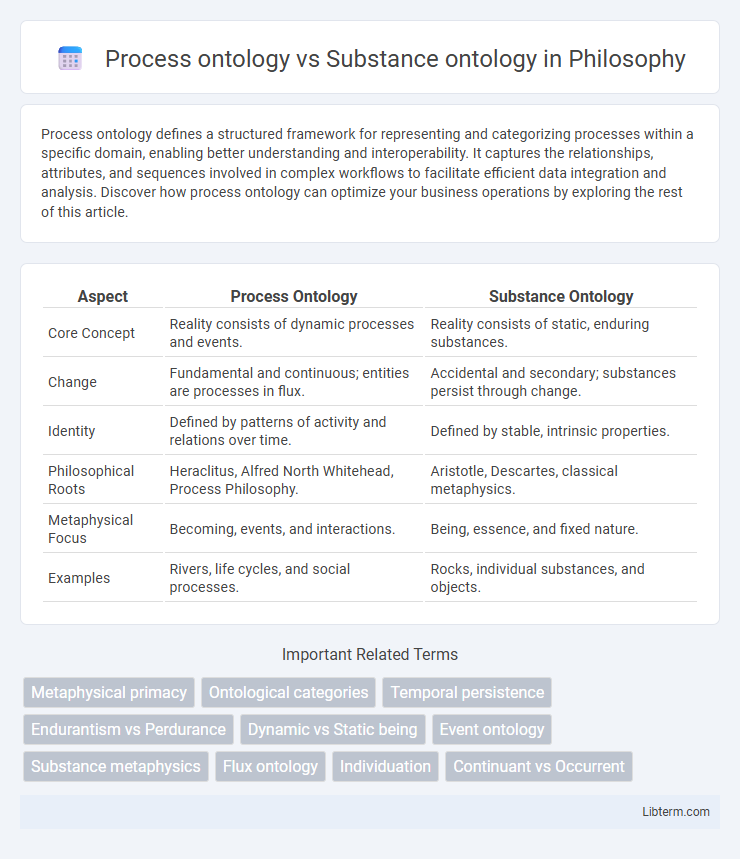Process ontology defines a structured framework for representing and categorizing processes within a specific domain, enabling better understanding and interoperability. It captures the relationships, attributes, and sequences involved in complex workflows to facilitate efficient data integration and analysis. Discover how process ontology can optimize your business operations by exploring the rest of this article.
Table of Comparison
| Aspect | Process Ontology | Substance Ontology |
|---|---|---|
| Core Concept | Reality consists of dynamic processes and events. | Reality consists of static, enduring substances. |
| Change | Fundamental and continuous; entities are processes in flux. | Accidental and secondary; substances persist through change. |
| Identity | Defined by patterns of activity and relations over time. | Defined by stable, intrinsic properties. |
| Philosophical Roots | Heraclitus, Alfred North Whitehead, Process Philosophy. | Aristotle, Descartes, classical metaphysics. |
| Metaphysical Focus | Becoming, events, and interactions. | Being, essence, and fixed nature. |
| Examples | Rivers, life cycles, and social processes. | Rocks, individual substances, and objects. |
Introduction to Ontology in Philosophy
Process ontology emphasizes becoming and change as fundamental aspects of reality, positing that entities are best understood through their processes and interactions. Substance ontology, rooted in Aristotelian tradition, asserts that being consists of enduring substances with properties that persist over time. In the introduction to ontology in philosophy, these contrasting frameworks highlight different metaphysical approaches to existence and identity.
Defining Substance Ontology
Substance ontology defines reality in terms of enduring entities or substances that possess properties and exist independently through time. It emphasizes the constancy and identity of these substances despite changes in their states or attributes. This framework contrasts with process ontology, which prioritizes dynamic processes and events as the fundamental constituents of reality.
Defining Process Ontology
Process ontology defines reality primarily through dynamic events and changes, emphasizing processes over static entities. It contrasts with substance ontology, which centers on enduring objects or substances as the fundamental units of existence. In process ontology, the identity of things is understood through their activities and interactions rather than through fixed attributes.
Historical Origins of Substance and Process Ontologies
Substance ontology originated in ancient Greek philosophy, primarily developed by Aristotle, who emphasized substances as fundamental entities possessing properties. In contrast, process ontology emerged from 20th-century philosophical movements, particularly influenced by Alfred North Whitehead's process philosophy, which highlights becoming and change as essential realities. The historical divergence reflects differing metaphysical commitments: substance ontology centers on static, enduring entities, while process ontology prioritizes dynamic, relational processes.
Core Principles of Substance Ontology
Substance ontology asserts that the fundamental reality consists of enduring entities or substances that possess properties independently of time and change. Core principles emphasize that substances are the primary bearers of properties, with identity persisting through variations in their attributes. This ontology contrasts with process ontology by prioritizing stable, discrete entities over dynamic processes as the basis of existence.
Core Principles of Process Ontology
Process ontology centers on the principle that reality is fundamentally constituted by processes and events rather than static substances or objects. It emphasizes change, becoming, and the relational nature of existence, where entities are understood as dynamic occurrences within networks of interactions. This ontology contrasts with substance ontology by prioritizing temporal development and continuous transformation over fixed essences.
Key Philosophers and Theoretical Approaches
Process ontology, championed by Alfred North Whitehead, emphasizes becoming and change as the fundamental nature of reality, contrasting with substance ontology which prioritizes static being and enduring entities, rooted in Aristotelian metaphysics and further developed by Descartes. Whitehead's process philosophy introduces actual occasions as the basic units of reality, highlighting dynamic interrelations and events over substance permanence. Substance ontology is closely associated with metaphysical thinkers like Aristotle and Leibniz, who focus on substances as underlying entities bearing properties, establishing a foundation for classical physics and traditional metaphysical frameworks.
Major Differences: Substance Ontology vs Process Ontology
Substance ontology centers on entities as stable, independent substances with properties that define their essence, emphasizing persistence through time. Process ontology prioritizes events, changes, and processes as fundamental, viewing entities as temporary manifestations within ongoing activities. The major difference lies in substance ontology's focus on static being, while process ontology highlights dynamic becoming and relations.
Applications in Science and Metaphysics
Process ontology emphasizes events and changes as fundamental, making it highly applicable in quantum physics and evolutionary biology where dynamic systems are modeled. Substance ontology, focusing on enduring entities as primary, supports classical physics and traditional metaphysics by framing reality in terms of stable objects and their properties. Both ontologies shape scientific methodologies and metaphysical interpretations, influencing contemporary debates on identity, causality, and the nature of existence.
Contemporary Debates and Future Directions
Contemporary debates in philosophy emphasize the distinctions between process ontology, which views reality as dynamic and constantly evolving, and substance ontology, which focuses on stable, enduring entities as the fundamental constituents of existence. Process ontology challenges traditional substance metaphysics by foregrounding change, interaction, and temporality, influencing fields like metaphysics, cognitive science, and ecology. Future directions involve integrating processual perspectives with advancements in quantum mechanics, artificial intelligence, and systems theory to better account for complexity and emergence in both natural and social phenomena.
Process ontology Infographic

 libterm.com
libterm.com